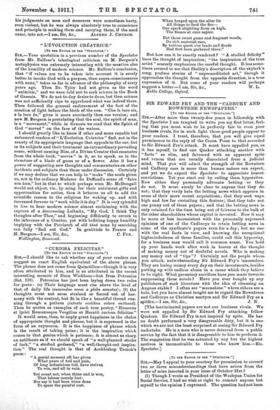" CURIOSA. FELICITAS."
[To THE EDITOR OF TEE " SPECTATOR.-3 Sin,—I should like to ask whether any of your readers can suggest an exact English equivalent of the above phrase. The phrase does not come from Quinctilian—though it is very often attributed to him, and is so attributed in the recent interesting memoir of Dean Wickham—but from Petronius (Sat. 118). Petronius has just been laying down two rules for poets : (a) Their language must rise above the level of that of daily life (sumendae votes a plebe semotae); (b) the thoughts must not seem strained or forced out of har- mony with the context, but fit in like a beautiful thread run- ning through a pattern (intexto vestibus colors eniteant). Then he quotes as examples of such true poetry, "Homerus et lyrici Romanusque Vergilius et Horatii curiosa felicitas."
It would seem, then, to imply great happiness in the choice of appropriate thought and phrase, but it is expressed in the form of an oxymoron. It is the happiness of phrase which is the result of taking pains ; it is the inspiration which comes to that genius which is patience; it is almost as sharp an antithesis as if we should speak of "a well-planned stroke of luck," "a. studied godsend," "a well-thought-out inspira- tion." The real thought is that of Archbishop Trench's poem : "A genial moment oft has given What years of toil and pain, Of long industrious toil, have striven To win, and all in vain.
Yet count not, when thine end is won, That labour merely lost: Nor say it had been wiser done To spare the painful cost. When heaped upon the altar lie All things to feed the fire— One spark alighting from on high, The flames at once aspire.
But those sweet gums and fragrant woods, Its rich material rare,
By tedious quest o'er lands and floods Had first been gathered there."
But how can it be exactly rendered P "A studied felicity" loses the thought of inspiration; " the inspiration of the true
artist" scarcely emphasizes the careful thought. It has some- times seemed to me that Shelley's description of the skylark's.
song, profuse strains of " unpremeditated art," though it approaches the thought from the opposite direction, is a true expression of it. But some of your readers will perhaps.
.1feble College, Oxford.






































































 Previous page
Previous page